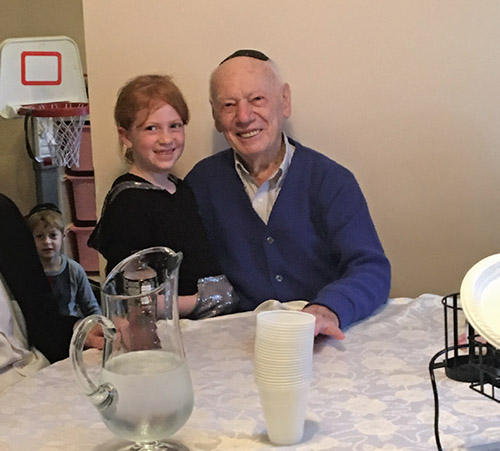



On Friday, June 16, Hy Miklacki, a 97-year-old active member of the Passaic Jewish community, peacefully passed away. He was one of the last male Holocaust-era survivors in the community. A standing-room-only crowd packed the Jewish Memorial Chapel in Clifton for his funeral service on Sunday, June 18.
Miklacki was born in Bialystok, Poland, a year after the end of World War I. Since his father passed away when he was a boy, he had to go to work to support his mother and sisters upon completing cheder at age 13. Following the Soviet-Nazi conquest of Poland in 1939, his mother decided that he and his best friend should get away from Poland and go farther east to Minsk, where they could stay with relatives.
There were food shortages in the wartime Soviet Union and, one time, Hy got caught stealing bread for his friend who was ill and so could not work and get a food ration card. They were sentenced to five years in the gulag for committing this “crime.”
Hy possessed a positive outlook on life and deeply believed in God. He learned, early on, an important lesson regarding “gam zu l’tovah” (this too is for the good). When the Soviets sent Hy to Siberia, he wondered why Hashem let this happen to him. It turned out to be all for the good. Shortly after he was sent to Siberia, Hitler’s armies invaded the Soviet Union (Operation Barbarossa) and killed almost all the Jews of Minsk. Unlike the Nazi lagers (camps), the Soviet camps in Siberia were not designed to exterminate Jews. The Soviets taught Hy a trade—how to be an electrician—which he later put to good use.
After the war, Hy was repatriated, together with other Polish citizens, back to Poland, where he discovered that he had no family who had survived the Nazi occupation. Hy then made his way to the American zone in Germany. His uncle and aunt in the Bronx were able to sponsor Hy’s entry to this country, since he had a trade—he was an electrician. Hy had no trouble joining the electricians’ union in the Bronx, most of whose members were Yiddish-speaking Jews. A couple of years later, Hy was set up on a blind date with the woman he later married—Ethel from Passaic. Hy married her and easily joined the electricians’ union in Passaic County, since by then his English was fluent.
Hy and Ethel were blessed with two children, Joel and Ellen, and eventually the family moved to the more suburban Passaic Park neighborhood and joined Ahavas Israel. Their kids grew up, married and blessed their parents with two grandchildren. Hy and Ethel were active in the Ahavas and remained so even after the Ahavas became an Orthodox shul. Hy lovingly took care of Ethel during her final illnesses. Upon her passing, Hy went to shul twice a day to say kaddish for her. He continued going twice a day even after the 11 months had passed. Hy started attending all the classes, programs and shiurim in the shul. He also returned to the full religious observance of his youth.
As Rabbi Ron Yitzchok Eisenman, spiritual leader of Ahavas Israel, said at the funeral, “Hy was the oldest baal teshuva in the shul.”
With his trademark smile, wit and Yiddish accent, Hy truly connected to the congregation where almost all of the members were decades younger than he. He received many Shabbat and Yom Tov invitations, but the connection Hy made with one family was exceptional. Malki and David Hurwitz have hosted Miklacki every Shabbat and Yom Tov for the past 10 years. The Hurwitz children don’t have grandparents living in New Jersey and Hy’s kids don’t live nearby, so Hy became the local zeide of the many Hurwitz children. It was a relationship that inspired the entire Passaic Jewish community.
Rabbi Eisenman eulogized Hy Miklacki as “a paragon of Jewish survival on both a historical and a personal level.”
May his memory be for a blessing.
By Shmuel Landesman










